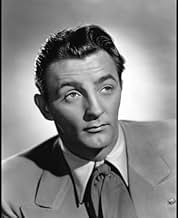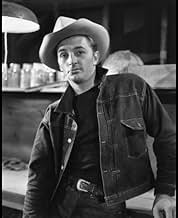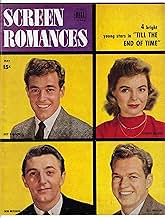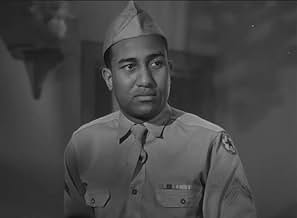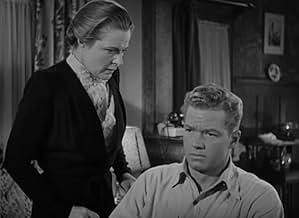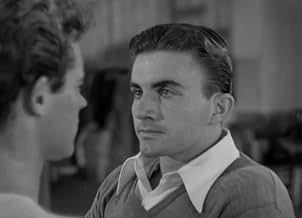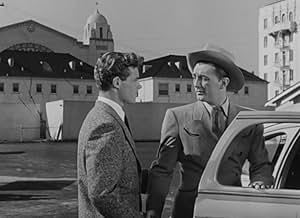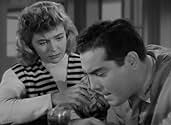IMDb RATING
6.7/10
1.7K
YOUR RATING
Drama about former WW2 Marines readjusting to civilian life and dealing with their mental and physical traumas.Drama about former WW2 Marines readjusting to civilian life and dealing with their mental and physical traumas.Drama about former WW2 Marines readjusting to civilian life and dealing with their mental and physical traumas.
- Awards
- 4 wins total
Harry von Zell
- Scuffy
- (as Harry Von Zell)
John Bailey
- Interviewer
- (uncredited)
Bobby Barber
- Arcade Game Player in Saloon
- (uncredited)
Bill Barnum
- Jackson
- (uncredited)
Dick Benjamin
- Sergeant
- (uncredited)
Paul Birch
- Marine Wanting Farm
- (uncredited)
- Director
- Writers
- All cast & crew
- Production, box office & more at IMDbPro
Featured reviews
Dorothy McGuire's performance (as Pat Ruscomb, war widow) is exceptionally good in this film. She is so convincing that viewers need focus on the effects of World War II on the war widows as much as the effects on returning servicemen. Despite her plight, she is the character that holds the film together when all else is chaos. One can only wonder how many women were left in like situations after the war. Where "The Best Years of Our Lives" adequately portrays the problems of readjustments of soldiers to civilian life, this film gives us a look at the sinister effect on those who remained on the home front. The scars on women, families, and homes do extend "till the end of time."
The year after World War II ended brought the first dramas to look at the plight of returning veterans trying to readjust to civilian norms. The Best Years of Our Lives was the big hit that year, but there were others, too. The title song in Till The End of Time, which was adapted from a Chopin polonaise, snakes through the movie wearing many skins, from saraband to Swing, constituting one of the more effective leitmotifs of 40s-movie scores. The story centers on Guy Madison, returning from the Pacific to his Los Angeles family. His parents expect the boy who left, not the man (physically, at least) who came back; they recoil when he wants to share his experiences in battle. So he starts to rebel against their sheltered and complacent life but has little idea of what to do with his own.
His love life is riven as well. One the one side there's the brash bobby-soxer next door, symbolizing what he used to be; on the other is weary war-widow Dorothy McGuire (among her most affecting roles), another survivor of the horrors of combat.
It's tempting to assume that Madison landed this meaty role (he's constantly on screen) solely because of his looks -- extraordinary, even by Hollywood standards. But he delivers a natural, if a bit bashful, performance. Only when buddy Robert Mitchum resurfaces halfway through the movie does he suffer by comparison. As a black sheep with a steel plate in his skull, Mitchum strikes the sparks that would ignite his long stardom; Madison, while pleasant and competent, comes up with nothing new and starts to grow monotonous (his career took him to TV westerns and European cheapies).
Director Edward Dmytryk (Murder, My Sweet; Back to Bataan) tones down for this leisurely character study, which remains absorbing and at times close to moving. He missteps once, very near the end, when a blast at bigotry comes flying out of left field, and he probably had to settle for the upbeat ending the studio wanted. But it was left to film noir, which dealt with similar issues obliquely (Blue Dahlia, Act of Violence, Dmytryk's own Crossfire) that probed them more profoundly.
His love life is riven as well. One the one side there's the brash bobby-soxer next door, symbolizing what he used to be; on the other is weary war-widow Dorothy McGuire (among her most affecting roles), another survivor of the horrors of combat.
It's tempting to assume that Madison landed this meaty role (he's constantly on screen) solely because of his looks -- extraordinary, even by Hollywood standards. But he delivers a natural, if a bit bashful, performance. Only when buddy Robert Mitchum resurfaces halfway through the movie does he suffer by comparison. As a black sheep with a steel plate in his skull, Mitchum strikes the sparks that would ignite his long stardom; Madison, while pleasant and competent, comes up with nothing new and starts to grow monotonous (his career took him to TV westerns and European cheapies).
Director Edward Dmytryk (Murder, My Sweet; Back to Bataan) tones down for this leisurely character study, which remains absorbing and at times close to moving. He missteps once, very near the end, when a blast at bigotry comes flying out of left field, and he probably had to settle for the upbeat ending the studio wanted. But it was left to film noir, which dealt with similar issues obliquely (Blue Dahlia, Act of Violence, Dmytryk's own Crossfire) that probed them more profoundly.
..If only to see beautiful and appealing Guy Madison in one of his earlier roles before lost to western films and TV ("Wild Bill Hickok") in the 1950s. Madison is the focal point here, portraying a returning serviceman from World War II and his subsequent adjustment to civilian life with sincerity and easy-going charm. Brad Pitt has a bit of his extremely handsome blonde, athletic looks, but not ingratiating acting prowess. (Madison is on the cover of "Hearthrob", a book about male cinema stars). Top-billed Dorothy McGuire is really support, somewhat of a matronly mis-matched love interest for the youthful Madison. A lovely score and good direction offset some dated aspects in the script. But Madison carries the day!
This takes one back to the end of WWII when GIs were being released from service and coming home to dubious situations.
Confused, disoriented, and restive, these ex-service men were suddenly thrust into lifestyles for which they were unprepared. From holding a bayoneted rifle to pushing a pencil, the transition was abrupt and strange.
Many drifted into and out of relationships, while others took to the bottle as a form of escape. "Till the End of Time" dramatizes a few of these plights with some interest.
Cast in the lead role was Guy Madison, newly "discovered" by Henry Willson and David O. Selznick for a snippet but memorable scene in "Since You Went Away" (and shot quickly while Madison was on navy leave). After being mustered out of the service a couple of years later, Hollywood was eagerly waiting to cast him in what really amounted to his first feature (barring the earlier "cameo"). Unfortunately it was a starring role.
That was a pity, for the young "find" needed small vehicles in which to mature and grow in the profession. That he comes off as well as he does here is commendable, yet it does him a great disservice. Guy's reedy, inconsistent, and even amateurish looking--qualities that would have been honed and polished, had he the sensitive career management other similar "discoveries" were afforded.
Having his greatest weaknesses so exposed in a lead part, Madison was "written off" for other starring roles, and pushed into routine westerns--where he more or less remained for the rest of his career. However, his appearance in some seven dozen radio, television and movie parts ain't especially hay. And while he may not have been considered the greatest actor, he did make an honest living that put food on the table for the rest of his life.
His costars here are the excellent Robert Mitchum and Dorothy McGuire, and they certainly help bolster the proceedings. All in all, "Till the End of Time" is an interesting drama, and Guy Madison's most notable vehicle.
The pop adaptation of Chopin's "Polanaise" played throughout doesn't hurt.
Confused, disoriented, and restive, these ex-service men were suddenly thrust into lifestyles for which they were unprepared. From holding a bayoneted rifle to pushing a pencil, the transition was abrupt and strange.
Many drifted into and out of relationships, while others took to the bottle as a form of escape. "Till the End of Time" dramatizes a few of these plights with some interest.
Cast in the lead role was Guy Madison, newly "discovered" by Henry Willson and David O. Selznick for a snippet but memorable scene in "Since You Went Away" (and shot quickly while Madison was on navy leave). After being mustered out of the service a couple of years later, Hollywood was eagerly waiting to cast him in what really amounted to his first feature (barring the earlier "cameo"). Unfortunately it was a starring role.
That was a pity, for the young "find" needed small vehicles in which to mature and grow in the profession. That he comes off as well as he does here is commendable, yet it does him a great disservice. Guy's reedy, inconsistent, and even amateurish looking--qualities that would have been honed and polished, had he the sensitive career management other similar "discoveries" were afforded.
Having his greatest weaknesses so exposed in a lead part, Madison was "written off" for other starring roles, and pushed into routine westerns--where he more or less remained for the rest of his career. However, his appearance in some seven dozen radio, television and movie parts ain't especially hay. And while he may not have been considered the greatest actor, he did make an honest living that put food on the table for the rest of his life.
His costars here are the excellent Robert Mitchum and Dorothy McGuire, and they certainly help bolster the proceedings. All in all, "Till the End of Time" is an interesting drama, and Guy Madison's most notable vehicle.
The pop adaptation of Chopin's "Polanaise" played throughout doesn't hurt.
After seeing the book Heartthrobs in the bookstore I was dying to see the beautiful man on the cover actually moving and speaking. Guy Madison is absolutely the most beautiful person that I have ever seen, male or female. Looking at him is truly like staring at a piece of art. It's no wonder some casting director thought to himself "the world needs to see this man 30 feet high" - the camera cannot seem to catch this guy at a bad angle. Guy is not the best actor you'll come across, but he is charming and earnest and hey his co-stars are Robert Mitchum and Dorothy McGuire so check it out! Dorothy's a fine actress, but a little matronly in this one - she's seems more like Guy's mother than a suitable love interest. If only they'd given her better ensembles - there's one scene with her in slip and much to my surprise she had a lovely little figure hiding under those awful jackets.
Did you know
- TriviaJean Porter and Edward Dmytryk met during the making of this film and would be married in 1948, until his death in 1999.
- GoofsOn the bus arriving at the Marine base at the beginning, California is misspelled "Caliornia."
- Quotes
Cliff Harper: You look awful!
William Tabeshaw: You look cute...
Cliff Harper: Come on in the house and we'll have a beer!
- ConnectionsFeatured in Hollywood the Golden Years: The RKO Story: Dark Victory (1987)
- SoundtracksTill the End of Time
by Buddy Kaye and Ted Mossman, based on Chopin's "Polonaise"
Music by Frédéric Chopin (uncredited)
- How long is Till the End of Time?Powered by Alexa
Details
- Release date
- Country of origin
- Language
- Also known as
- Hasta el fin del tiempo
- Filming locations
- Production companies
- See more company credits at IMDbPro
- Runtime
- 1h 45m(105 min)
- Color
- Aspect ratio
- 1.37 : 1
Contribute to this page
Suggest an edit or add missing content

